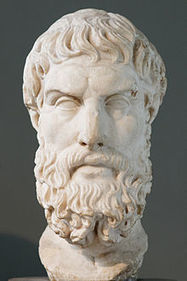Atheism is, in the broadest sense, the absence of belief in the existence of deities.[1][2][3][4] Less broadly, atheism is the rejection of belief that any deities exist.[5][6] In an even narrower sense, atheism is specifically the position that there are no deities.[1][2][7] Atheism is contrasted with theism,[8][9] which, in its most general form, is the belief that at least one deity exists.[9][10][11]
The term "atheism" originated from the Greek ἄθεος (atheos), meaning "without god(s)", used as a pejorative term applied to those thought to reject the gods worshiped by the larger society.[12] With the spread of freethought, skeptical inquiry, and subsequent increase in criticism of religion, application of the term narrowed in scope. The first individuals to identify themselves using the word "atheist" lived in the 18th century during the Age of Enlightenment.[13] The French Revolution, noted for its "unprecedented atheism," witnessed the first major political movement in history to advocate for the supremacy of human reason.[14]



 Your new post is loading...
Your new post is loading...










Atheism is, in the broadest sense, the absence of belief in the existence of deities.[1][2][3][4] Less broadly, atheism is the rejection of belief that any deities exist.[5][6] In an even narrower sense, atheism is specifically the position that there are no deities.[1][2][7] Atheism is contrasted with theism,[8][9] which, in its most general form, is the belief that at least one deity exists.[9][10][11]
The term "atheism" originated from the Greek ἄθεος (atheos), meaning "without god(s)", used as a pejorative term applied to those thought to reject the gods worshiped by the larger society.[12] With the spread of freethought, skeptical inquiry, and subsequent increase in criticism of religion, application of the term narrowed in scope. The first individuals to identify themselves using the word "atheist" lived in the 18th century during the Age of Enlightenment.[13] The French Revolution, noted for its "unprecedented atheism," witnessed the first major political movement in history to advocate for the supremacy of human reason.[14]